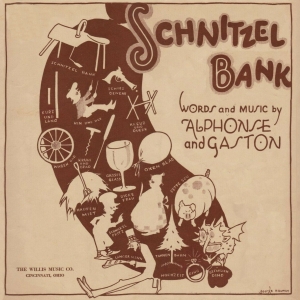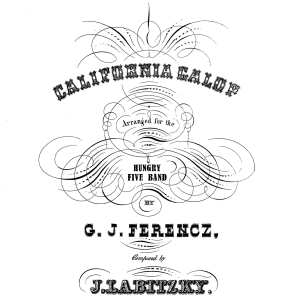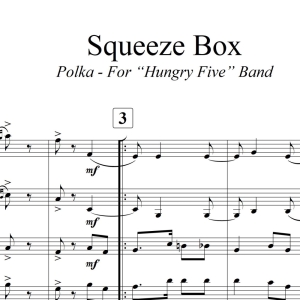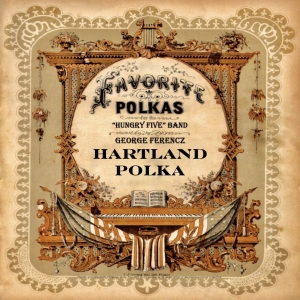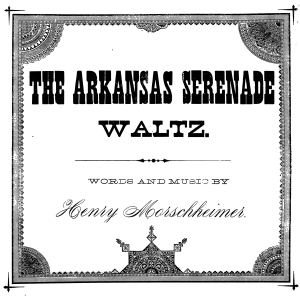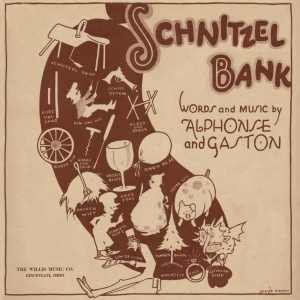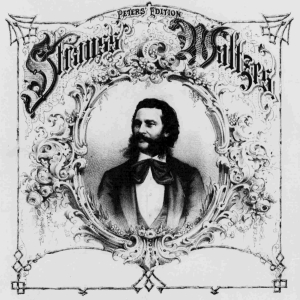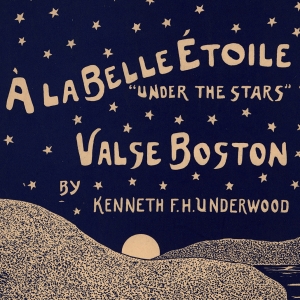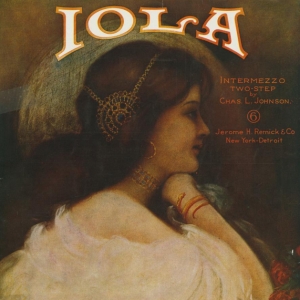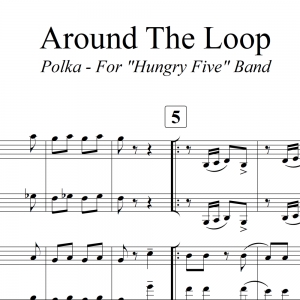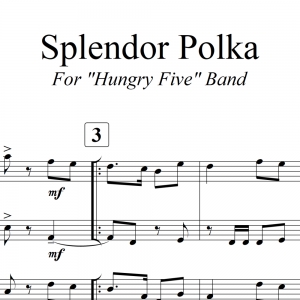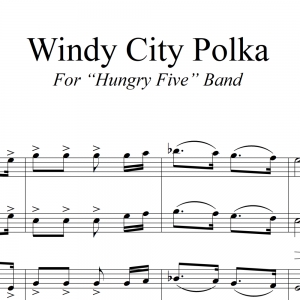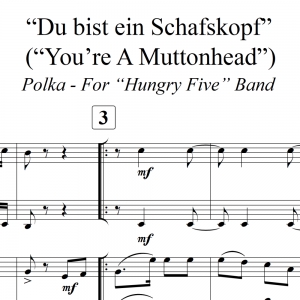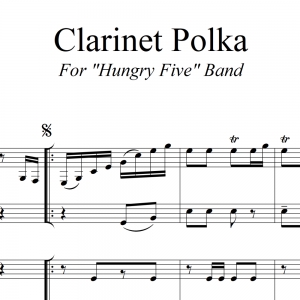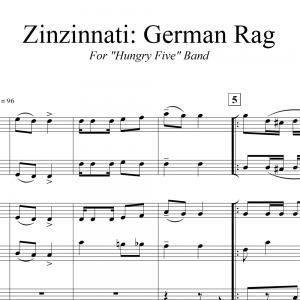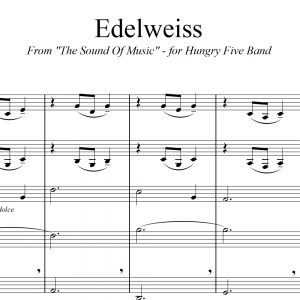
George Ferencz
The long-beloved tavern-rousing drinking song “Schnitzelbank” is presented here in an arrangement for Solo Accordion (or piano).
This fun arrangement offers the harmonized melody with accompaniments built in, at times with standard chord changes but at times adding new harmonic wrinkles.
Chord symbols are included throughout the piece.
Ready to go for your Oktoberfest gig!
Part also included in an arrangement for Hungry Five Band
The uptempo “California Galop” is presented here in an arrangement for the instrumentation of Alford’s “Hungry Five” series of Polka/German band books. In this edition, the melody gets passed back and forth between the various instruments along with a number of other active lines and transitions to keep things interesting for players and listeners alike.
This fun arrangement fits right in with the style of the other traditional Hungry Five pieces. There are no extreme range requirements in this arrangement and the technical challenges shouldn’t be out of reach for intermediate players so even fairly young ensembles could include this on a German band performance. Ready to go for your Oktoberfest OomPah gig!
This fun little polka by the one and only Lawrence Welk is presented here in an arrangement for the instrumentation of Alford’s “Hungry Five” series of Polka/German band books. This lighthearted piece provides opportunity for all players to take on melodic as well as other interesting accompaniment patterns that get passed around the ensemble, maintaining variety and momentum throughout for players and listeners alike.
No extreme range or technical requirements are presented here for any of the instrumentalists in this arrangement. Even fairly young ensembles could use this piece for a German band performance. Ready to go for your Oktoberfest OomPah gig!
This fun polka is presented in the instrumentation of Alford’s “Hungry Five” series of Polka/German band books. Atypical to those classic publications, there are some lively 16th note runs featured in the tuba part during the opening strain (you may want your tuba player to set the tempo for this one). Across the rest of the ensemble, everybody gets a chance to take on the melody along with a number of other active lines and transitions to keep things interesting for players and listeners alike.
This composition fits right in with the style of the other traditional Hungry Five pieces. There are no extreme range requirements (other than some lovely chalumeau register clarinet lines and a trombone part that briefly reaches its way up to 3rd ledger line “G”) and the technical challenges shouldn’t be out of reach for intermediate players so even fairly young ensembles could include this on a German band performance. Ready to go for adding another excellent polka to your Oktoberfest OomPah gig!
Arkansas composer Henry Morschheimer’s “Arkansas Serenade” waltz is presented here in an arrangement for the instrumentation of Alford’s “Hungry Five” series of Polka/German band books. In this edition, the melody gets passed back and forth between the various instruments along with a number of other active lines and transitions to keep things interesting for players and listeners alike.
This fun arrangement fits right in with the style of the other traditional Hungry Five pieces. There are no extreme range requirements in this arrangement (other than some lovely chalumeau register clarinet lines and a trombone part that briefly reaches its way up to an A-flat) and the technical challenges shouldn’t be out of reach for intermediate players so even fairly young ensembles could include this on a German band performance. Ready to go for adding a fine waltz to your Oktoberfest OomPah gig!
The long-beloved tavern-rousing drinking song “Schnitzelbank” is presented here in an arrangement for the instrumentation of Alford’s “Hungry Five” series of Polka/German band books. In this edition, the melody gets passed back and forth between the various instruments along with a number of other active lines and transitions to keep things interesting for players and listeners alike.
This fun arrangement fits right in with the style of the other traditional Hungry Five pieces. There are no extreme range requirements in this arrangement and the technical challenges shouldn’t be out of reach for intermediate players so even fairly young ensembles could include this on a German band performance.
An optional accordion part with chord symbols is also included. (available separately for Solo Accordion)
Ready to go for your Oktoberfest OomPah gig!
A lovely pair of composer Johann Strauss, Jr.'s waltzes are presented here in an arrangement for the instrumentation of Alford’s “Hungry Five” series of Polka/German band books. In this edition, the melody for “Artist’s Life” is handled by the clarinets, then they pass the job over to the brasses for the “Tales from the Vienna Woods” section.
These familiar classic melodies will fit right in on a program right alongside other Hungry Five pieces. There are no extreme range requirements in this arrangement, and the technical challenges shouldn’t be out of reach for intermediate players so even fairly young ensembles could include this on a German band performance. Ready to go for your Oktoberfest OomPah gig!
American composer Kenneth F. H. Underwood published “À La Belle Étoile - “Under the Stars” - Valse Boston” for solo piano in 1911 through New York’s West End Publishing. It is presented here in an arrangement for the instrumentation of Alford’s “Hungry Five” series of Polka/German band books. In this edition, the waltz melody gets passed back and forth between the various instruments along with a number of other active lines to keep things interesting for players and listeners alike.
While this piece shouldn’t feel out of place in context with other Hungry Five pieces, this longer composition allows for a more extended musical statement alongside shorter polka and waltz tunes. There are no extreme range requirements in this arrangement (other than some lovely chalumeau register tones for the clarinets), and the technical challenges shouldn’t be out of reach for intermediate players so even fairly young ensembles could include this on a German band performance. Ready to go for your Oktoberfest OomPah gig!
American composer Charles L. Johnson (1876-1950) published “Iola - Intermezzo/Two-step” for solo piano in 1906 through Remick & Co. It is presented here in an arrangement for the instrumentation of Alford’s “Hungry Five” series of Polka/German band books. In this edition, the melody gets passed back and forth between the various instruments along with a number of other active lines to keep things interesting for players and listeners alike.
While “Iola” shouldn’t feel out of place in context with other Hungry Five pieces, this longer composition allows for a more extended musical statement alongside shorter polka tunes. There are no extreme range requirements in this arrangement, and the technical challenges shouldn’t be out of reach for intermediate players so even fairly young ensembles could include this on a German band performance. Ready to go for your Oktoberfest OomPah gig!
E. Frances’s danceable polka melody gets presented here in an arrangement for the instrumentation of Alford’s “Hungry Five” series of Polka/German band books. This lighthearted piece provides opportunity for all players to take on melodic as well os other interesting accompaniment patterns that get passed around the ensemble, maintaining variety and momentum throughout for players and listeners alike.
No extreme range or technical requirements are presented here for any of the instrumentalists in this arrangement. Even fairly young ensembles could use this piece for German band performance. Ready to go for your Oktoberfest OomPah gig!
The traditional Italian “Splendor” polka is presented here in an arrangement for the instrumentation of Alford’s “Hungry Five” series of Polka/German band books. Besides the melody, other accompaniment patterns also get passed around between all of the different instrumental parts maintaining variety and momentum throughout for players and listeners alike.
No extreme range or technical requirements are presented here for any of the instrumentalists in this arrangement. Even fairly young ensembles could use this piece for German band performance. Ready to go for your Oktoberfest OomPah gig!
O. Sokol’s homage to the city of Chicago is presented here in an arrangement for the instrumentation of Alford’s “Hungry Five” series of Polka/German band books. This lighthearted piece provides opportunity for all players to take on melodic as well os other interesting accompaniment patterns that get passed around the ensemble, maintaining variety and momentum throughout for players and listeners alike.
No extreme range or technical requirements are presented here for any of the instrumentalists in this arrangement. Even fairly young ensembles could use this piece for German band performance. Ready to go for your Oktoberfest OomPah gig!
Fritz Wolter’s piece with the fun title (worthy of wisecracks!) is presented here in an arrangement for the instrumentation of Alford’s “Hungry Five” series of Polka/German band books. Besides the melody, other accompaniment patterns also get passed around between all of the different instrumental parts maintaining variety and momentum throughout for players and listeners alike.
No extreme range or technical requirements are presented here for any of the instrumentalists in this arrangement. Even fairly young ensembles could use this piece for German band performance. Ready to go for your Oktoberfest OomPah gig!
This classic clarinet solo is presented here in an arrangement for the instrumentation of Alford’s “Hungry Five” series of Polka/German band books as a chance to feature a talented clarinetist in your ensemble. In this edition, the solo clarinetist plays the familiar melody throughout while accompanied by the remainder of the ensemble.
Other than the technical nature of the 1st Clarinet part (which is probably already well under the fingers of an experienced player), there are no extreme range or technical requirements for the remaining instrumentalists in this arrangement. Even fairly young ensembles could use this to feature a more advanced clarinetist on a German band performance. Ready to go for your Oktoberfest OomPah gig!
Nancy Bierbaum composed “Zinzinnati” in 1907 and her tribute to the Ohio city is presented here in an arrangement for the instrumentation of Alford’s “Hungry Five” series of Polka/German band books. In this edition, the melody gets passed back and forth between the various instruments along with a number of other active lines to keep things interesting for players and listeners alike.
While “Zinzinnati” shouldn’t feel out of place in context with other Hungry Five pieces, this longer composition has a more syncopated ragtime flavor to it. There are no extreme range requirements in this arrangement, and the technical challenges shouldn’t be out of reach for intermediate players so even fairly young ensembles could use this to include some syncopated fun on a German band performance. Ready to go for your Oktoberfest OomPah gig!
“Edelweiss” is presented here in an arrangement for the instrumentation of Alford’s “Hungry Five” series of Polka/German band books. In this edition, the enduring and beloved melody from Rodgers & Hammerstein’s “The Sound Of Music” gets passed back and forth between the various instruments to keep things interesting for players and listeners alike.
Every Hungry Five band should keep a familiar waltz like this at the ready at all times as a change-up between all the other marchlike polkas normally played on such gigs. There are no extreme range or technical challenges in this arrangement, so even fairly young ensembles could use this to include some Broadway classiness on a German band performance. Ready to go for your Oktoberfest OomPah gig!




